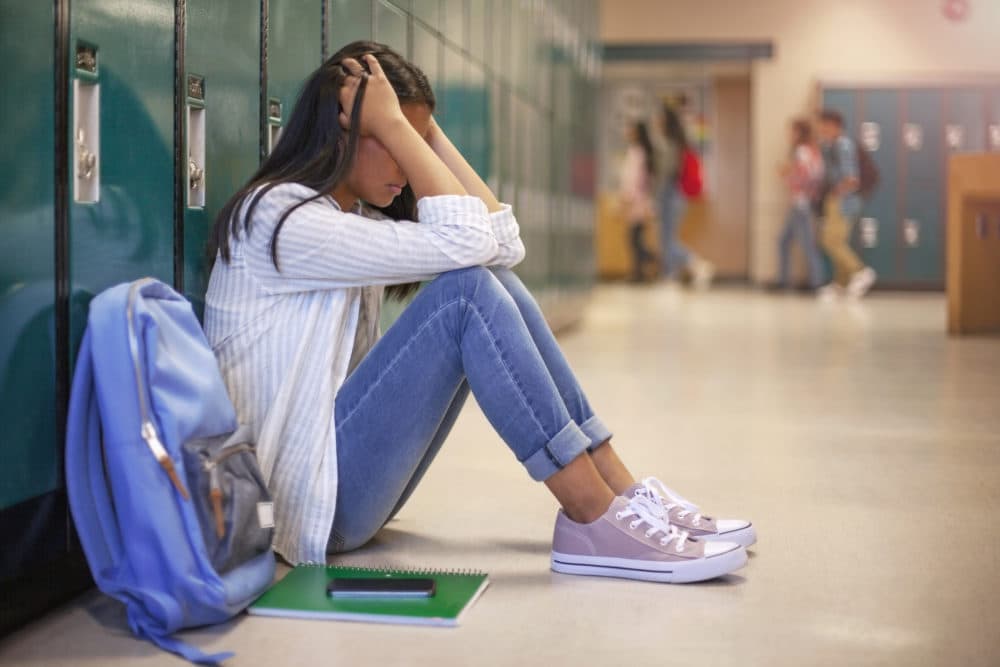Advertisement
Bill Elevates Focus On Mental Health In Schools

A wide-ranging bill aimed at addressing a what advocates say is a youth behavioral health crisis would create a group tasked with state officials on behavioral health, provide technical assistance and professional development to school districts, and mandate age-appropriate behavioral health education.
The Mental Health, Substance Use, and Recovery Committee heard testimony Wednesday afternoon on Rep. Marjorie Decker's legislation, which is also called the Thrives Act. Supporters of the bill say it takes a holistic approach to addressing behavioral health needs across the state.
The legislation would also establish a council tasked with advising state agencies and Legislature on the implementation of a multi-tiered system of behavioral health promotion, prevention, and intervention services in school districts.
The 10-member group would include the state's mental health, public health, and education commissioners. Decker said people tend to work in "silos" when approaching behavioral health.
"It really brings together a broad group of people who are all doing important work, but do not have a mandatory formal place to come and talk about best practices and training," the Cambridge Democrat said.
"Prior to the pandemic, we did not have enough services in our schools, nor in our hospitals to address the growing crisis of children's mental health needs," Decker said. " ... Because we have not adequately provided families, students, and schools with the tools to meet the needs of our adolescents and youth's mental health, it grows into a crisis."
School-based behavioral health services range from support offered by counselors to more comprehensive integrated programs aimed at prevention and treatment, according to the American Academy of Pediatrics. Courtney Chelo, a children's mental health advocate, said children and youth are three times more likely to access those services if they are provided at school.
"However, many schools do not have the resources and capacity to address the behavioral health needs of all students, and are often under-equipped to support the needs of Black and brown students whose behaviors are subject to punitive measures like suspension and expulsion at 2.2 times the rate of their white peers," said Chelo, who works at the Massachusetts Society for the Prevention of Cruelty to Children.
Advertisement
The bill requires the advisory group to form a biannual plan that addresses state financing of school-based behavioral health programs, professional development, and technical assistance, among other things.
Alice Cohen, a youth services planner for Cambridge Public Schools, said school officials are seeing an "alarming increase" in young people reporting anxiety, depression, and selfharm.
"The need that we have at the moment exceeds our capacity, and our services favor the privileged," Cohen said. "What that means is that young people are forced to repeatedly fail, in order to be seen. We exclude these children with punitive and restrictive measures just at the moments when they need us the most."
The legislation also creates a technical assistance center that provides web-based, in-person, and remote support to administration, teachers, and school-behavioral health staff. UMass Boston School Psychology Professor Melissa Pearrow said 75% of youth who seek out behavioral health supports find them at schools.
"That is one of the reasons why we're helping advocate around this Thrive Act because we see the need for a statewide technical assistance center," Pearrow said.
As Pearrow and other colleagues broached the idea of a technical assistance center, they surveyed more than 500 school behavioral health providers, conducted seven focus groups, talked to 20 state agency staff, and other states that provide technical assistance.
"And what we've learned is that some areas have a greater need than others. Western Mass. and the Cape, they're asking for this at higher rates," she said. "They're asking for help with professional development structures. They're asking for help with technical assistance and elevating parent voice."
The legislation also requires all public schools to mandate physical and mental health education for students in all grades.
The mental health education programs "shall recognize multiple dimensions of health by including mental health, and the relationship of physical health and mental health, so as to enhance student understanding, attitudes and behaviors that promote health, well-being and human dignity,†the bill says.
Angela Wallace, a former Sharon Public Schools student, said as a Black woman who was educated in a predominantly white school, she felt isolated and pressured to prove "my worth and intelligence in a society that doubts my ability to succeed."
"I found myself engaging in activities that led to persistent sadness and suicidal thoughts as a means of proving myself to others," Wallace said. "Society tells me to assume the role of the strong Black woman, a damaging image that requires me to suppress my feelings, thereby sacrificing my mental and physical well being in order to please others."
Fortunately, Wallace said, her mother encouraged her to seek therapy outside of school. Numerous friends, she said, have shared their struggle with mental health and said they refused to seek help or discuss their mental state in high school for fear of negative perceptions.
"While sex education has been at the forefront of my health education for many years, there is also a dire need to incorporate a mental health curriculum that will serve to promote well being and enhance student understanding of mental health topics," said Wallace, who now attends Bowdoin College. "This will work towards addressing the feelings of hopelessness my peers and I frequently face."